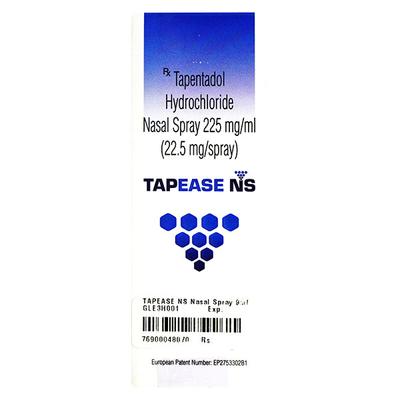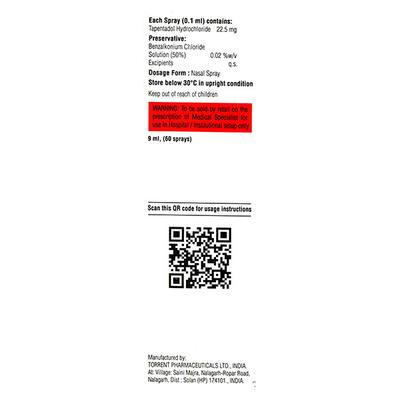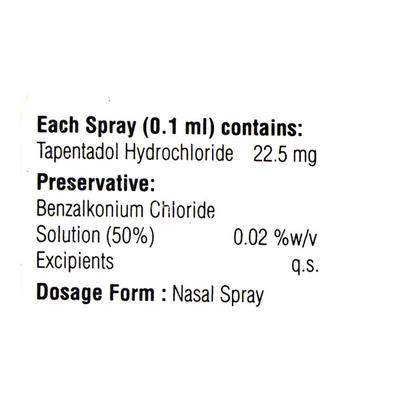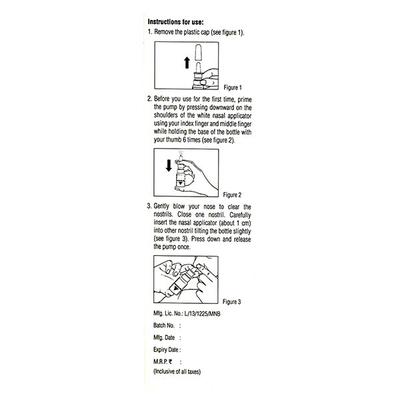

Netmeds First Membership
Quick Links
Introduction About TAPEASE NS NASAL SPRAY
TAPEASE NS NASAL SPRAY contains Tapentadol which belongs to the group of medicines called Painkillers. It is used in the management of moderate to severe pain post-operatively in patients who are admitted in the hospital.
TAPEASE NS NASAL SPRAY is not recommended for use in patients having severe kidney or liver impairment, lung diseases and no bowel movements.
TAPEASE NS NASAL SPRAY should be used with caution in patients who have increased pressure in the brain, altered consciousness, had head injury, had brain tumour, pancreatic diseases, biliary duct disease, tendency towards fits or tendency of getting habitual to medicines.
TAPEASE NS NASAL SPRAY should not be used in pregnant women unless advised by the doctor and breast-feeding women. There is no information on the use of TAPEASE NS NASAL SPRAY in children, adolescents and elderly patients, hence, ask for your doctor’s advice before using.
The most common side effects of using TAPEASE NS NASAL SPRAY are nausea, vomiting, headache and fever. Talk to your doctor if any of these side effects worsen or doesn’t improve after using TAPEASE NS NASAL SPRAY.
Uses Of TAPEASE NS NASAL SPRAY
- Manage moderate to severe postoperative pain
How TAPEASE NS NASAL SPRAY Works
TAPEASE NS NASAL SPRAY acts directly on the central nervous system and reduces the feeling of pain by interrupting the way in which pain is signalled between brain and the body. TAPEASE NS NASAL SPRAY binds with certain receptors called µ-opioid receptors and also increases the release of a nerve chemical called norepinephrine which causes inhibition of certain receptors leading to pain relief.
How to use TAPEASE NS NASAL SPRAY
Use TAPEASE NS NASAL SPRAY as advised by your doctor. It is for external use only. Gently blow and clear the nostrils. Close one nostril by pressing with the help of your finger. Tilt your head slightly forward, keep the bottle of TAPEASE NS NASAL SPRAY upright and carefully insert the nasal applicator into the other nostril. Press down and release the pump once. Your doctor will decide the correct dose and duration for you depending upon your age, condition and body weight.
Side Effects Of TAPEASE NS NASAL SPRAY
Common
- nausea
- vomiting
- headache
- fever
How To Manage Side Effects
Nausea:
Stick to simple meals. Avoid eating oily, fried or spicy foods. Ask for your doctor’s advice if nausea doesn’t improve.
Vomiting:
Drink clear or ice-cold drinks, eat light, bland foods and avoid fried, oily or sweet foods. Ask for your doctor’s advice if vomiting doesn’t improve.
Headache:
Try to take rest and don’t involve yourself in exertive activities. Apply a pain-relieving balm on your forehead. Ask for your doctor’s advice if headache doesn’t improve.
Warning & Precautions
Pregnancy
TAPEASE NS NASAL SPRAY is not recommended for use in pregnant women unless considered clearly necessary. Consult with your doctor before using it.
Breastfeeding
TAPEASE NS NASAL SPRAY is not recommended for use in breastfeeding women as it may pass through breast milk. Consult your doctor before using it.
Driving and Using Machines
Do not drive or use machinery if you feel drowsy, dizzy, blurring of vision or slow reaction time after using TAPEASE NS NASAL SPRAY.
Alcohol
Avoid the use of alcohol while using TAPEASE NS NASAL SPRAY as it may increase the drowsiness.
Kidney
TAPEASE NS NASAL SPRAY is not recommended for use in patients with severe renal impairment. Consult your doctor before using it.
Liver
TAPEASE NS NASAL SPRAY is not recommended for use in patients with severe liver impairment. Lower doses may be used in patients who have moderate liver impairment. Consult your doctor before using TAPEASE NS NASAL SPRAY.
Allergy
Do not use TAPEASE NS NASAL SPRAY if you are allergic to Tapentadol.
Lungs
TAPEASE NS NASAL SPRAY is not recommended for use in patients having lung diseases such as asthma or dangerously slow and shallow breathing (hypercapnia, respiratory depression). It should be used with caution in patients having other breathing issues. Consult with your doctor before using TAPEASE NS NASAL SPRAY.
Others
TAPEASE NS NASAL SPRAY is not recommended for use if you have:
- no bowel movement (severe constipation and bloating, pain or discomfort in the lower abdomen)
Before using TAPEASE NS NASAL SPRAY, inform your doctor if you:
- have increased pressure in the brain
- have disturbed consciousness up to coma
- have had a head injury
- have had a brain tumour
- have a disease affecting pancreatic or biliary tract such as pancreatitis
- have increased risk of epilepsies
- have tendency to abuse medicines (getting habitual of it)
- have lactose intolerance
Interactions
A. Drug – Drug Interactions:
Before using TAPEASE NS NASAL SPRAY, inform your doctor if you are taking any of the following medicines:
- sedatives such as zolpidem, eszopiclone, anti-anxiety drugs such as citalopram, antidepressants such as paroxetine, sertraline and anti-psychotics such as loxapine, clozapine, MAO inhibitors such as isocarboxazid (used to manage depression, anxiety, mood disorders, sleep disturbances)
- opioids such as codeine, oxymorphone, mixed mu-opioid agonist/antagonists such as pentazocine, nalbuphine, partial mu-opioid agonists such as buprenorphine (used to manage severe pain)
- antihistamines such as cetirizine, loratadine (used to manage allergy)
- phenobarbital (used to manage epilepsy)
- rifampicin (used to manage tuberculosis)
- st. john’s wort (herbal medicine used to manage depression)
Overdosage:
If you or anyone else accidentally use too much of TAPEASE NS NASAL SPRAY, consult your doctor immediately or visit the nearby hospital. Overdosage symptoms of TAPEASE NS NASAL SPRAY are pin-point pupils, vomiting, fast heartbeat, drop in blood pressure, collapse, disturbed consciousness or coma (deep unconsciousness), epileptic fits (convulsion), dangerously slow or shallow breathing or stopping breathing may occur.
Synopsis
| Drug | : | Tapentadol |
| Pharmacological Category | : | mu-opioid agonists |
| Therapeutic Indication | : | Moderate to severe postoperative pain |
| Dosage Forms | : | Tablet, Capsule, Nasal Spray |
More Information
- Keep TAPEASE NS NASAL SPRAY out of reach of children
- Store at room temperature below 25°C
FAQs About TAPEASE NS NASAL SPRAY
What is TAPEASE NS NASAL SPRAY and why is it prescribed?
TAPEASE NS NASAL SPRAY contains Tapentadol which belongs to the group of medicines called Painkillers. It is used in the management of moderate to severe pain post-operatively in patients who are admitted in the hospital.
How to use TAPEASE NS NASAL SPRAY?
Use TAPEASE NS NASAL SPRAY as advised by your doctor. It is for external use only. Gently blow and clear the nostrils. Close one nostril by pressing with the help of your finger. Tilt your head slightly forward, keep the bottle of TAPEASE NS NASAL SPRAY upright and carefully insert the nasal applicator into the other nostril. Press down and release the pump once. Your doctor will decide the correct dose and duration for you depending upon your age, condition and body weight.
Is TAPEASE NS NASAL SPRAY a habit-forming medicine?
TAPEASE NS NASAL SPRAY may cause dependence. If you have a tendency to become habitual to medicines or if you are dependent on medicines, you should only use TAPEASE NS NASAL SPRAY for short periods. You must consult with your doctor priorly and discuss with them.
Can I stop using TAPEASE NS NASAL SPRAY on my own if I start to feel better?
You must not stop using TAPEASE NS NASAL SPRAY until and unless your doctor asks you to. Stopping suddenly or too soon may cause your pain to return. If you have been using TAPEASE NS NASAL SPRAY for quite some time and you stop suddenly, you may experience symptoms such as restlessness, runny nose, yawning, watery eyes, sweating, chills, muscle pain, joint pain, dilated pupils, irritability, anxiety, backache, weakness, abdominal cramps, difficulty in sleeping, loss of appetite, vomiting, nausea, diarrhoea and increase in blood pressure, breathing or heart rate. If you feel any such symptoms or at all you wish to discontinue using TAPEASE NS NASAL SPRAY, ask for your doctor’s advice.
Does TAPEASE NS NASAL SPRAY affect my ability to drive?
TAPEASE NS NASAL SPRAY may make you sleepy, cause vision changes or have slow reaction time. Do not drive or use machinery if you feel drowsy, dizzy, blurring of vision or slow reaction time after using TAPEASE NS NASAL SPRAY. You can resume with your activities once you feel normal again.
What other precautions shall I follow while using TAPEASE NS NASAL SPRAY?
Inform your doctor priorly if you are taking certain medicines to manage depression that affects serotonin levels. Taking these medicines with TAPEASE NS NASAL SPRAY may cause serotonin syndrome. The signs include involuntary, rhythmic contractions of muscles, including the muscles that control movement of the eye, excessive sweating, agitation, tremor, exaggeration of reflexes, increased muscle tension and fever.
References
1. KD. Tripathi. Opioid Analgesics and Antagonists. Essentials of medical pharmacology. Eighth edition. 2018. Page – 505.
2. Dewan Roshan Singh, Kusha Nag, Akshaya N. Shetti, N. Krishnaveni. Tapentadol hydrochloride: A novel analgesic. NIH National Library of Medicine, National center for biotechnology information. Pubmed Central. September 2013. [Accessed on 18th August 2022] https://www.ncbi.nlm.nih.gov/pmc/articles/PMC3757808/
3. Ankit Javia & Hetal Thakkar. Intranasal delivery of tapentadol hydrochloride–loaded chitosan nanoparticles: formulation, characterisation and its in vivo evaluation. September 2017. [Accessed on 18th August 2022] https://www.tandfonline.com/doi/abs/10.1080/02652048.2017.1375038?journalCode=imnc20
4. Torrent Pharmaceuticals Ltd. Tapease NS (Tapentadol Hydrochloride Nasal Spray). [Revised in November 2021] [Accessed on 18th August 2022] https://www.torrentian.com/pisheet/Upload/PI_Sheet/2999.pdf











